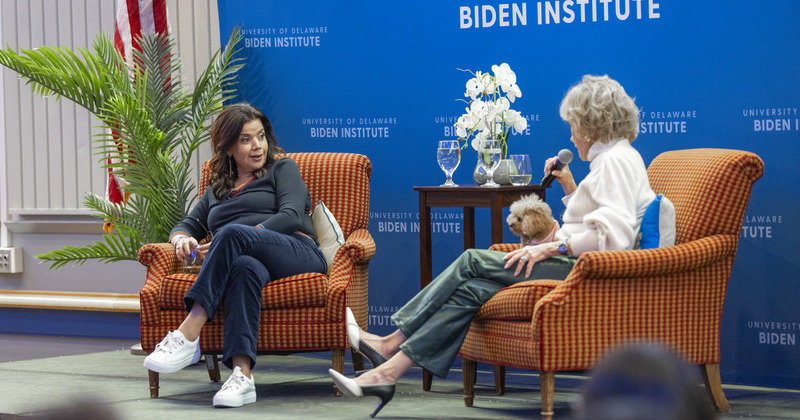


Diverse and Distinct
Photos by Maria Errico October 29, 2024
Republican strategist Ana Navarro discusses the complexities of the Latino vote
Ridiculous. That’s how Republican strategist Ana Navarro describes the monolithic notion of “the Latino vote.”
“It’s almost as ridiculous as talking about the white vote,” said the political commentator and co-host of The View, who recently sat down with Valerie Biden Owens, chair of UD’s Biden Institute, for a candid conversation on “The Impact of the Latino Vote” in honor of Hispanic Heritage Month.
The event was hosted by the Biden Institute in collaboration with HOLA, Campus Alliance de la Raza and the Lambda Sigma Upsilon Latino Fraternity Inc.
Speaking on Oct. 15 as part of the Biden Institute policy dinner series to engage students in meaningful dialogue, Navarro highlighted the broad spectrum of political opinions within the Latino population.
“There are progressive Latinos, socially conservative Latinos, pro-life Latinos, pro-choice Latinos, Latinos who have crossed the border, Latinos for whom the border crossed them,” she said.
And while their opinions may vary on hot-button issues like abortion and immigration, Latinos are united by a desire to be recognized and respected for their heritage and contributions to the nation, she added, noting their high rates of military service.

Speaking to nearly 200 students, alumni, faculty, staff and community members at the Trabant University Center, Navarro’s message of rich, cultural diversity was reflected in the audience itself.
Moses Martinez, a graduate student in the 4+1 public administration program, helped organize the event, in part, because the Latino vote is so misunderstood. With a father from Mexico and a mother from Guatemala, the Milford, Delaware, native said that his parents “lean right,” while Martinez leans left. “It has taught me to see a middle ground, which is important when America is so divided,” he said.
Computer science student Diego Quijada hails from Bowie, Maryland, though his family originates from El Salvador. “I try to stay away from the two-party system,” Quijada said, “because I don’t want to limit my options.”

Meanwhile, Gabriela Rojas, a finance major from Wilmington, Delaware, whose parents are from Mexico, is still “exploring” her political identity. She attended the dinner as a fan of Navarro’s, joining attendees of all ages interested in hearing the pundit’s perspective.
Alumna Karen Queen now lives in Colombia, Maryland, where she works in business development. As a 2004 history graduate, Queen remains fascinated by her degree and tries to attend at least one UD event each year.She was interested in hearing Navarro speak because “events don’t happen in a vacuum; something led up to it,” Queen said. “I like to understand, ‘How did we get here?’ I’m interested in the shifts in the Latino vote and in what [Navarro] has to say."
Others echoed Queen’s remarks, while some wondered aloud if Navarro’s trusty poodle, ChaCha, would make an appearance. Indeed, the puppy did, spending much of the evening nestled comfortably in Owen’s lap.
A crucial voting bloc
Given the timing of her speech, Navarro reflected on the growing importance of the Hispanic electorate in American politics. With Pennsylvania housing one of the largest Puerto Rican communities in the country, Latino voters are crucial in shaping electoral outcomes in key battleground states.
However, Navarro emphasized that their vote cannot be assumed. “Nobody wants to be taken for granted—it doesn’t matter the color, gender, group,” she said.
A significant portion of her remarks centered around the reasons some Latinos support Donald Trump, a topic that Navarro admitted she wrestles with herself. She referenced a recent New York Times poll that found 67% of Latinos surveyed don’t believe Trump’s anti-immigrant rhetoric applies to them, illustrating the complexity of his appeal.
When asked by Owens whether Latinos are attracted to the former president’s policies or personality, Navarro pointed out that for many Latinos fleeing communism, his rhetoric resonates emotionally.
Navarro, herself an immigrant from Nicaragua, said that Democrats have failed to counter Republican accusations of being socialists, which triggers deep fears among exiles of authoritarian regimes.
As a vocal critic of Trump, she proposed an alternate script. “Democrats should be saying, ‘Let me tell you about communism. Communists attack the free press. They refuse to accept fair and true elections if the results don’t go their way. They incite violence to stay in power.’”
Navarro also warned against Trump's language that pits Black Americans against Latinos. She criticized Trump's framing of immigrants as taking away low-skilled jobs from Black workers, calling it a narrow and demeaning view of both groups.

Kamala Harris, meanwhile, must be a voice for all Americans, she said, including Latinos.
“Speak to us. Make us feel seen,” advised Navarro, who added that Harris’ recent appearances on Fox News and other media outlets reflect a commitment to doing so.
Despite her critiques, Navarro remains a registered Republican because she believes in the importance of a healthy, two-party system.
“Big problems need bipartisan solutions,” she said. “America is exceptional. There’s nothing we can’t do when we are united.”
About the Biden Institute
The Biden Institute, established at the University of Delaware’s Joseph R. Biden, Jr. School of Public Policy and Administration in March of 2017, is a world-class intellectual center and destination for scholars, activists, policymakers and national leaders. The mission at the Biden Institute is to bring together the sharpest minds and the most powerful voices to address our nation’s toughest problems, while educating and engaging the next generation of leaders.
Contact Us
Have a UDaily story idea?
Contact us at ocm@udel.edu
Members of the press
Contact us at 302-831-NEWS or visit the Media Relations website

